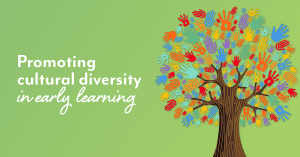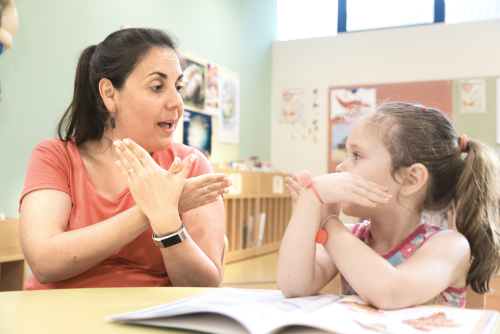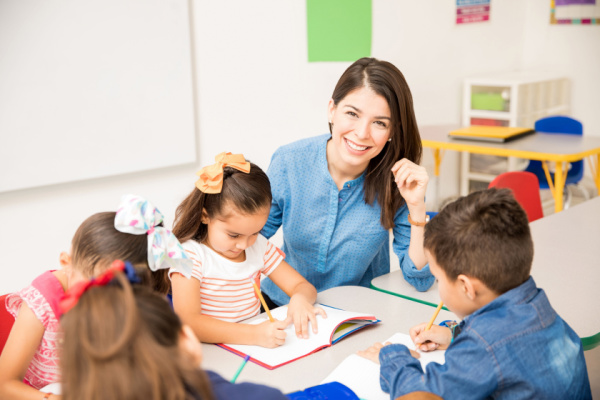Cultural differences are everywhere and in early childhood settings there will be families from a wide variety of cultures. Acknowledging and celebrating cultural diversity is important in early childhood education. It can inspire children to not only accept differences but to respect and celebrate them.
Culture is a fundamental part of identity and shapes who we are. The way we look, think, communicate, behave, celebrate holidays and even what we eat is tied in with our cultural backgrounds. By ensuring there is a focus on cultural inclusion in early learning, we can help to ensure that children grow up with a sense of belonging for themselves and a belief that everyone belongs.

What is cultural competence?
Cultural competence refers to the ability to understand and interact with people from a range of cultures. Being open to and respectful of another’s cultural perspectives or background is the beginning of being culturally competent. A person’s culture can include their ethnicity, appearance, religion, cuisine, social habits, beliefs, values and more.
The Early Years Learning Framework (EYLF) recognises cultural competence as:
- being aware of one’s own world view
- developing positive attitudes towards cultural differences
- gaining knowledge of different cultural practices and world views
- developing skills for communication and interaction across cultures
In providing children with a culturally competent early childhood education experience, educators must first reflect on their own level of cultural competence. Cultural competence asks educators explore their ability to understand, communicate with, and effectively interact with people across various cultures. It’s important to be able to respect and celebrate diversity and what it brings to communities.
The impact of cultural diversity in ECE
As powerful role models in children’s lives, demonstrating cultural competence as an educator is crucial. Celebrating cultural diversity can have a positive impact on children’s acceptance of differences and their sense of belonging in the early childhood education environment and beyond.
Embracing cultural diversity in early childhood settings can strengthen partnerships with families. Quality Area 6 of the National Quality Standard (NQS) highlights the importance of collaborative partnerships with families and makes specific reference to respecting parents views, stating “The expertise, culture, values and beliefs of families are respected”.
Not only does cultural competence in educators and services support partnerships with families, it also fosters inclusion for all children. A diverse celebration of culture in early childhood can shape children’s views of the world now and well into the future.
Practical ways to promote cultural diversity in ECE settings
Showing respect for diversity and celebrating a variety of cultures is simple, enjoyable and engaging. In many ways young children can inspire adults in the way they accept differences and diversity. Early childhood educators can harness that acceptance and foster it to shape a culturally inclusive future for all.
There are countless ways you can foster broad cultural awareness in your early childhood service — here are just five to inspire you:
Invite educators and families to share: Representation is important and we can help encourage pride in culture. Invite families or educators to share their traditions and culture with the service. They might share their traditional dress, food, music, games or just share stories about their unique culture.
Celebrate a variety of cultural events: Many services celebrate Christmas and Easter, but consider what other dates are on the cultural calendar that you can also incorporate into your service. Diwali, Ramadan, Hanukkah, Lunar New Year — there are many!
Encourage discussion about differences: Rather than avoid differences, embrace them. Encourage children to explore their differences, what they bring to the group, and what makes them special. As part of that discussion, also help them see all that they have in common too. It might hair or eye colour, or even things like hobbies, foods, a favourite colour or animal. Our similarities with other people always outnumber our differences.
Respond to discriminatory behaviour: Children often speak their minds and they may make discriminatory remarks without meaning to or understanding. It’s important not to ignore remarks that culturally offensive. For example, comments about someone’s appearance, food, use of English and so on. Rather than telling children off, use the behaviour to reinforce that everyone is unique and special. Refer back to discussion around what makes us all different but then focus on the similarities children share.
Create a diverse environment: Children learn a lot from their environment, so creating diversity in what’s around them can go a long way toward embracing diversity. Ensure your service offers dolls with various skin tones and hair colours, books with families of all kinds, play music and explore songs and dances from around the world and consider providing foods that reflect different cultures and flavours.
Shaping an inclusive world
A sense of belonging and inclusion in the world starts from childhood. Educators can play a vital role in helping children feel that they belong, and educating children in the beauty of diversity and importance of accepting all cultures.
Encourage children’s understanding of differences and appreciation of diversity in all aspects of life and set them on a path to become kind and compassionate human beings.
Learn more about our early childhood courses here.



